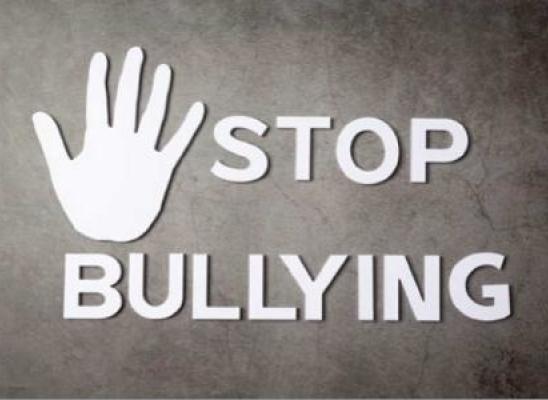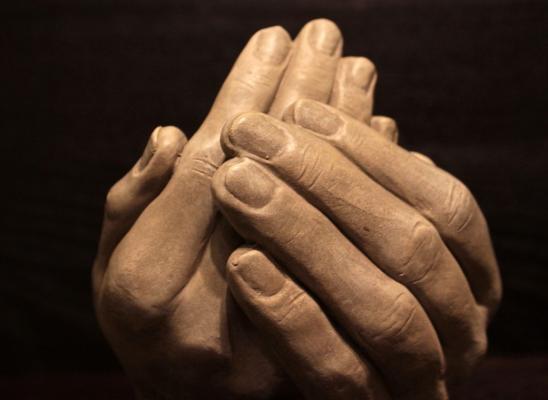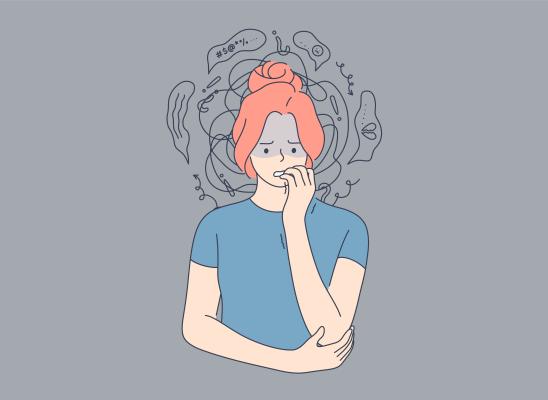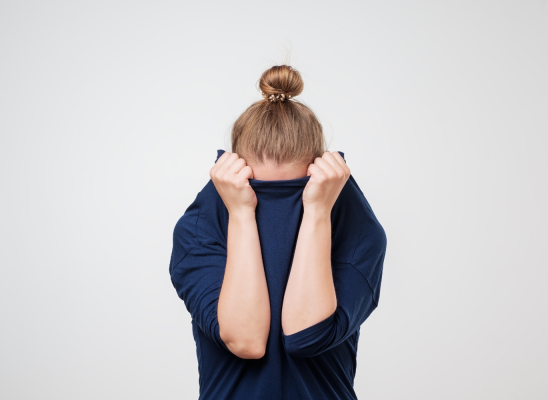Skin Picking: Attention-Seeking or Avoidance?
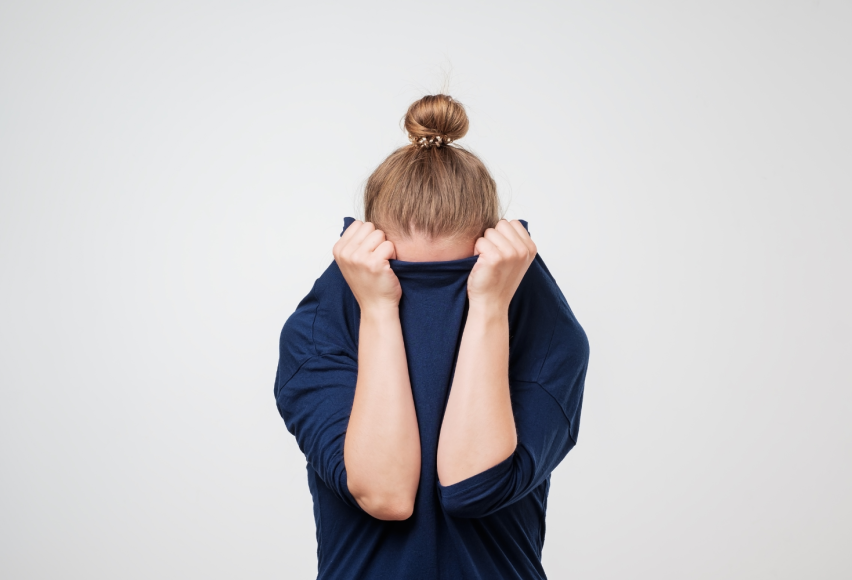
Online test
Find out the severity of your symptoms with this free online test
Skin picking disorder, clinically known as Excoriation Disorder, is one of the most misunderstood disorders. On the surface, it can appear to be an untreated dermatological disorder or a habit of picking at one’s acne, or even the result of poor skin care. However, beneath the surface lies a complex condition with psychological underpinnings.
One of the most enduring misconceptions about skin picking and other body focused repetitive behaviors (BFRBs) like hair pulling, is that it’s a behavior choice and people do it for attention. The fact is, nothing could be further from the truth. In this article, we delve into the reality behind this myth, uncovering the true motivations and challenges faced by individuals with skin picking disorder.
A Closer Look at Skin Picking
Let’s be honest, most of us have picked at a blemish a little too long and maybe even left a bit of visible skin damage behind. We are able to simply stop picking at the spot. For people living with skin picking, that stop signal is a bit more complicated.
Skin picking disorder, also known as Excoriation Disorder, is a body-focused repetitive behavior (BFRB) characterized by repetitive picking of the skin resulting in lesions and injury to the skin tissue, significant emotional distress, and impaired psychosocial functioning. It is classified as an Obsessive Compulsive Related Disorder (OCRD) in the Diagnostic and Statistical Manual of Mental Disorders (DSM5). Skin picking is different from OCD, but it does share similar qualities. One of those similarities is the presence of compulsions.
Compulsions are similar to habits in that they can become automatic. However, unlike habits that are reflexive behaviors, compulsions are driven by intense psychological urges to complete a certain behavior in an effort to relieve feelings of anxiety or distress. They are not easily changed by simply gaining awareness or deciding to stop. (One of the reasons why “just stop” doesn’t work for most.) Dealing with compulsions usually requires psychological treatment intervention. Skin picking and other BFRBs like hair pulling behaviors are driven by these urges.
When it comes to skin picking, looks can be deceiving. Skin picking disorder is not a dermatological disorder that can be treated with creams, pills, or potions. It is a mental disorder that usually requires treatment, most often psychotherapy. It is not uncommon for people with a BFRB like skin picking have other co-occurring mental health disorders including depression or anxiety, post-traumatic stress disorder (PTSD) or ADHD.
You might wonder why someone just can’t stop picking. Don’t they feel pain? Don’t they know that they’re injuring their skin? Yes, and yes. However, research suggests that people who experience skin picking may have differences in sensory perceptions of affective touch and pain that may be a factor in skin picking.
While research is still unclear as to exactly why someone develops skin picking, evidence suggests that its origins lie in one’s experiences and ability to regulate their emotions. As emotional distress rises, the need (urge) to dispel that discomfort increases. Skin picking results in successful avoidance and feelings of relief and gratification, reinforcing the behavior. One may also experience other feelings such as guilt or shame but the skin picking validates the cycle. This process reinforces the skin picking, setting up the cycle to be repeated.
So, it is an avoidance behavior, and one that leaves visible evidence of that struggle behind. And this is where the attention argument breaks down.
Attention vs Avoidance
Qualitative studies have shown that people living with skin picking experience high levels of shame, disgust, and embarrassment about their disorder and its effects. This in turn creates a desire to avoid or withdrawal from social interactions where others may notice or comment on the skin damage.
In fact, people with skin picking disorder work really hard to avoid attention. They report worrying excessively about having to be in social situations where their skin may be noticed. Avoiding social situations is a commonly used tactic to avoid attention. The problem is that in an effort to keep others at a distance, it creates a sense of isolation and can erode one’s sense of well-being.
This avoidance of attention should not be misconstrued as a desire to be alone. In fact, most people want to be able to interact with others and enjoy social situations. Social connection is a critical factor in psychological well-being. The problem is overcoming the fears that come with those interactions.
When social situations can’t be avoided, they describe going to great lengths to cover or camouflage their skin damage, sometimes spending hours doing so. Social interactions can exacerbate feelings of shame and embarrassment, and the worry of being judged or misunderstood.
This worry of being judged or misunderstood has the added effect of making it hard for people dealing with skin picking to seek help. While they report wanting to seek help, the fear of being judged or misunderstood by a therapist. However, for those who do seek help, they report feeling relieved and heard.
The Takeaway
When it comes to mental health disorders like skin picking, what it appears to be isn’t the whole picture. A person may be dealing with so much more inside that you just can’t see. Stigma and misconceptions can be harmful and make it hard for someone to gather up the courage to seek help.
If you or a loved one is dealing with a mental health issue like skin picking, take time to learn about the disorder. There is treatment. There is community, and there is support.
References
1. Chapter 6. Obsessive-Compulsive and Related Disorders. (n.d.). Psychiatry Online. https://dsm.psychiatryonline.org/doi/10.1176/appi.books.9781585624836.jb06
2. American Psychological Association. (n.d.). Compulsion. APA Dictionary of Psychology. https://dictionary.apa.org/compulsion
3. Grant, J. E., & Chamberlain, S. R. (2020). Prevalence of skin picking (excoriation) disorder. Journal of Psychiatric Research, 130, 57-60. https://www.sciencedirect.com/science/article/pii/S0022395620308773
4. Schienle, A., Übel, S., & Wabnegger, A. (2018). Neuronal responses to the scratching and caressing of one's own skin in patients with skin-picking disorder. Human brain mapping, 39(3), 1263–1269. https://pubmed.ncbi.nlm.nih.gov/29218753/
5. Grant, J. E., Redden, S. A., & Chamberlain, S. R. (2017). Cold pressor pain in skin picking disorder. Psychiatry research, 249, 35–38. https://www.ncbi.nlm.nih.gov/pmc/articles/PMC5345741/
6. Roberts, S., O’Connor, K., Aardema, F., Bélanger, C., & Courchesne, C. (2016). The role of emotion regulation in body-focused repetitive behaviours. The Cognitive Behaviour Therapist, 9, e7. https://www.cambridge.org/core/journals/the-cognitive-behaviour-therapist/article/abs/role-of-emotion-regulation-in-bodyfocused-repetitive-behaviours/8E267245687F7D75A63ED2B2214482D1
7. Anderson, S., Clarke, V., & Thomas, Z. (2022). The problem with picking: Permittance, escape and shame in problematic skin picking. Psychology and Psychotherapy: Theory, Research and Practice, 96(1), 83-100. https://bpspsychub.onlinelibrary.wiley.com/doi/10.1111/papt.12427
8. 8 myths (And facts) about excoriation (Skin picking disorder). (2023, July 12). The Recovery Village Drug and Alcohol Rehab. https://www.therecoveryvillage.com/mental-health/excoriation/skin-picking-myths/
Online test
Find out the severity of your symptoms with this free online test
Start your journey with SkinPick
Take control of your life and find freedom from skin picking through professional therapy and evidence-based behavioral techniques.
Start Now
